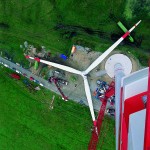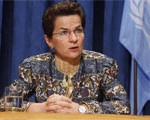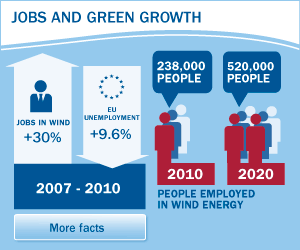 Talks aimed at reaching a new international agreement to limit and then reduce emissions caused by greenhouse gases were set to ramp up to a higher level today as national environment ministers joined the ongoing negotiations in Cancun.
Talks aimed at reaching a new international agreement to limit and then reduce emissions caused by greenhouse gases were set to ramp up to a higher level today as national environment ministers joined the ongoing negotiations in Cancun.
Remi Gruet, the European Wind Energy Association’s regulatory affairs advisor who is attending the two-week-long United Nations Framework Convention on Climate Change (UNFCCC) conference, said Monday that observers are wondering if the ministers can take the negotiations to a higher level than the first week of talks.
“The mood of many negotiators now is they don’t know what to do,” Gruet told me.
 It may look like one machine, but the average wind turbine is made up of 9,000 different components. Each of these needs to be manufactured, transported and put together, and a blip or delay at any one stage can affect the whole process.
It may look like one machine, but the average wind turbine is made up of 9,000 different components. Each of these needs to be manufactured, transported and put together, and a blip or delay at any one stage can affect the whole process.
The supply chain is crucial to the wind energy industry, with 75% of the total cost of energy for a wind turbine is related to upfront expenses such as the cost of the turbine, foundation, electrical equipment and grid connection.
Many of the materials used in wind turbines – such as stainless steel, aluminum, glass and carbon fibres — are also required in other industries, making a smoothly operating wind power supply chain all that more important.
 There’s a great deal of exposure and chatter on the internet these days to two recent North American newspaper columns that are highly positive of wind power when it comes to public health issues.
There’s a great deal of exposure and chatter on the internet these days to two recent North American newspaper columns that are highly positive of wind power when it comes to public health issues.
One of the columns, published 26 November in The Oregonian, noted that “in fact, with no air or water pollution emissions, wind energy is essential to reducing public health impacts from the energy sector.”
Written by scientists Robert J. McCunney, Robert Dobie and David M. Lipscomb, the column went on to say that “while there are legitimate issues worth debating with regard to wind energy development, public health impacts are not among them.”
 It’s that time of year again when the world’s attention shifts to the overwhelming need to limit and then radically reduce greenhouse gases caused by burning fossil fuels.
It’s that time of year again when the world’s attention shifts to the overwhelming need to limit and then radically reduce greenhouse gases caused by burning fossil fuels.
Organised by the United Nations Framework Convention on Climate Change (UNFCCC), the talks that started Monday in Cancun don’t appear to be laden down by the heady excitement that was palpable when last year’s annual conference began in Copenhagen.
As the world now knows, that optimism soon turned sour as the resulting so-called Copenhagen Accord was neither a legally-binding treaty to replace the Kyoto Protocol which lapses in 2012 nor a plan to reduce greenhouse gas emissions that are causing global warming.
 The Greek government is convinced that investing in renewable energies is the most efficient way to reshape the country’s beleaguered economy, Greek Energy Minister Tina Birbili told Wind Directions magazine recently.
The Greek government is convinced that investing in renewable energies is the most efficient way to reshape the country’s beleaguered economy, Greek Energy Minister Tina Birbili told Wind Directions magazine recently.
A few months ago, the government raised the 2020 renewables target to 20% – higher than the 18% goal set in the EU Renewable Energy Directive. Birbili explains that this is because “boosting green development” is seen as the best way for Greece to achieve its “energy, environmental and economic growth targets”.
The new legislative framework, passed in June this year will help, she says. It should speed up permitting processes, remove barriers to grid connections and kick off the development of offshore wind energy. The next step is to extend and reinforce the grid, and improve connections to other countries.
 Talks aimed at reaching a new international agreement to limit and then reduce emissions caused by greenhouse gases were set to ramp up to a higher level today as national environment ministers joined the ongoing negotiations in Cancun.
Talks aimed at reaching a new international agreement to limit and then reduce emissions caused by greenhouse gases were set to ramp up to a higher level today as national environment ministers joined the ongoing negotiations in Cancun.






 Comments
Comments



